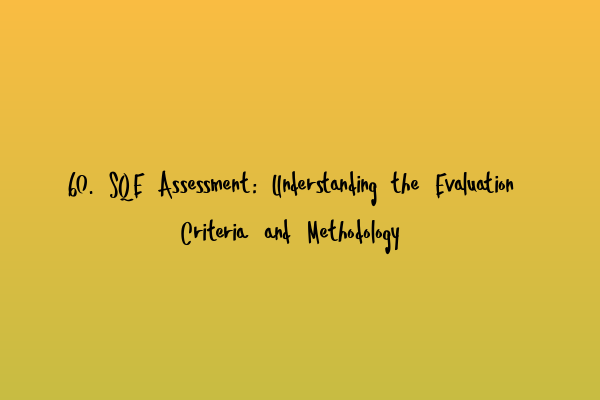60. SQE Assessment: Understanding the Evaluation Criteria and Methodology
If you’re on the path to becoming a qualified solicitor in the United Kingdom, you’ve likely come across the new Solicitors Qualifying Examination (SQE). This comprehensive assessment is designed to test your knowledge, skills, and practical application of legal principles. Understanding the evaluation criteria and methodology of the SQE is crucial to succeeding in this high-stakes exam.
In this article, we’ll dive deep into the evaluation criteria and methodology of the SQE, providing you with valuable insights and strategies to enhance your performance. So, let’s get started!
The Evaluation Criteria
The SQE is divided into two stages: SQE1 and SQE2. Each stage consists of different assessments that evaluate specific aspects of legal knowledge and skills.
SQE1 Evaluation Criteria:
1. Critical Thinking and Problem Solving: This assessment tests your ability to analyze complex legal scenarios and apply logical reasoning to reach appropriate conclusions. Key skills evaluated include analysis, evaluation, and synthesis of legal information.
2. Case and Matter Analysis: This assessment focuses on your ability to apply legal knowledge to practical scenarios. You’ll be presented with case studies, hypothetical situations, or legal problems and must demonstrate your understanding and application of relevant legal principles.
3. Legal Research and Writing: This assessment measures your skills in conducting legal research, understanding legal authorities, and effectively communicating your findings in writing. You’ll be tasked with analyzing legal sources, such as statutes, case law, or legal commentary, and expressing your conclusions clearly and concisely.
SQE2 Evaluation Criteria:
1. Legal Research and Writing (including drafting and oral communication): This assessment evaluates your abilities in legal research, legal writing (including drafting), and oral communication. You’ll be required to demonstrate your understanding of legal principles, articulate legal arguments, and effectively communicate your ideas.
2. Advocacy and Oral Communication: This assessment focuses on your advocacy skills, including your ability to present legal arguments persuasively, respond to questions from legal professionals, and effectively communicate your position.
3. Client Interviewing and Legal Advising: This assessment evaluates your ability to conduct effective client interviews, demonstrate empathy, identify legal issues, provide accurate legal advice, and effectively communicate with clients.
The Evaluation Methodology
The SQE assessments are designed to evaluate candidates in a fair and consistent manner. To ensure credibility and accuracy, the evaluation methodology employs several key components:
1. Objective Testing: SQE1 consists of multiple-choice questions and multiple-response questions. This format allows for the assessment of your knowledge, understanding, and application of legal principles in a controlled and standardized manner.
2. Written Assessments: SQE1 and SQE2 include written assessments that evaluate your legal writing, analysis, and communication skills. These assessments may involve answering legal problems, drafting legal documents, or providing legal advice in written form.
3. Oral Assessments: SQE2 includes assessments that test your oral communication skills. These assessments may involve presenting legal arguments, participating in mock courtroom exercises, or conducting client interviews.
4. Role-Play Assessments: Certain elements of the SQE2 assessments, such as client interviewing and legal advising, involve role-play scenarios to assess your ability to interact with clients professionally and provide legal advice.
It’s important to note that the SQE assessments are designed not only to test your knowledge of legal principles but also to assess your practical skills and ability to apply legal knowledge in real-life scenarios. Therefore, it’s crucial to develop a well-rounded preparation strategy that includes both theoretical understanding and practical application.
Conclusion
Understanding the evaluation criteria and methodology of the SQE is essential for anyone aspiring to become a qualified solicitor. By familiarizing yourself with the evaluation criteria and reviewing the related articles linked below, you’ll be better equipped to plan your study approach and enhance your chances of success:
- SQE Strategies: Proven Tactics to Ace the Solicitors Qualifying Examination
- SQE Case Studies: Applying Knowledge in Real-Life Scenarios
- SQE Exam Strategy: Planning and Executing for Optimal Performance
- Solicitors Qualifying Examination (SQE): Your Gateway to Legal Practice
- Mastering Time Management in SQE: Strategies for Efficient Exam Completion
With a clear understanding of the evaluation criteria, coupled with effective strategies and practice, you’ll be well-prepared to tackle the SQE with confidence.
